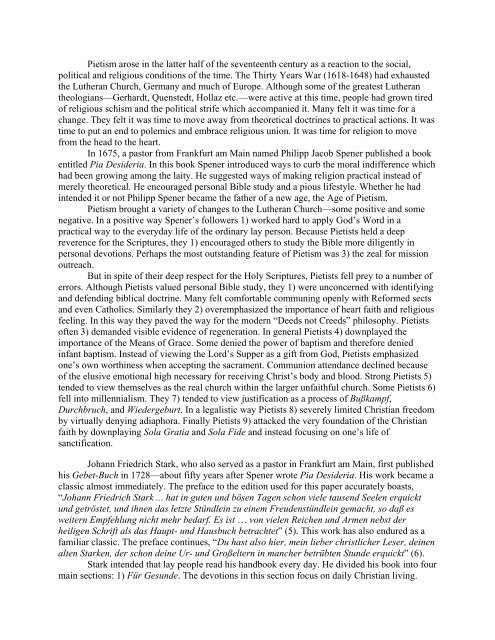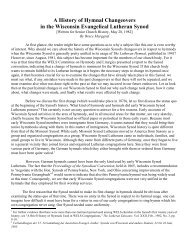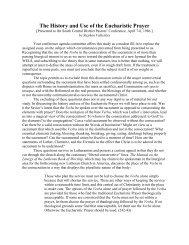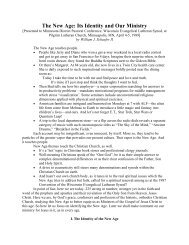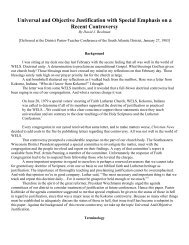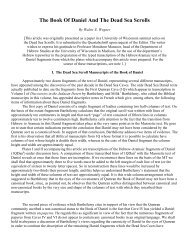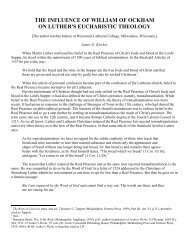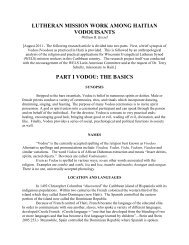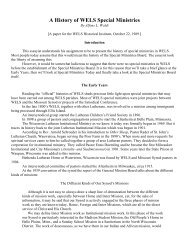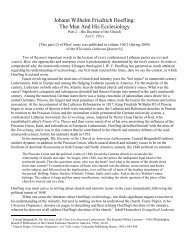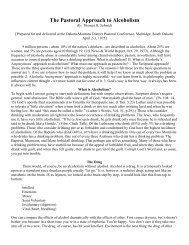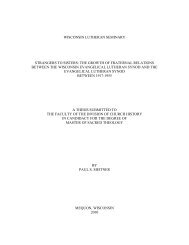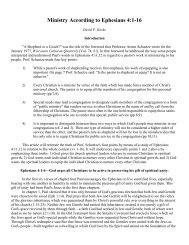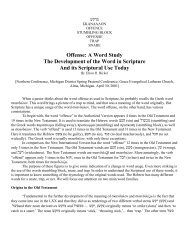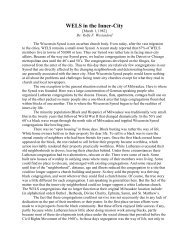An Examination of the Pietistic Content of Johann Friedrich Stark
An Examination of the Pietistic Content of Johann Friedrich Stark
An Examination of the Pietistic Content of Johann Friedrich Stark
Create successful ePaper yourself
Turn your PDF publications into a flip-book with our unique Google optimized e-Paper software.
Pietism arose in <strong>the</strong> latter half <strong>of</strong> <strong>the</strong> seventeenth century as a reaction to <strong>the</strong> social,<br />
political and religious conditions <strong>of</strong> <strong>the</strong> time. The Thirty Years War (1618-1648) had exhausted<br />
<strong>the</strong> Lu<strong>the</strong>ran Church, Germany and much <strong>of</strong> Europe. Although some <strong>of</strong> <strong>the</strong> greatest Lu<strong>the</strong>ran<br />
<strong>the</strong>ologians—Gerhardt, Quenstedt, Hollaz etc.—were active at this time, people had grown tired<br />
<strong>of</strong> religious schism and <strong>the</strong> political strife which accompanied it. Many felt it was time for a<br />
change. They felt it was time to move away from <strong>the</strong>oretical doctrines to practical actions. It was<br />
time to put an end to polemics and embrace religious union. It was time for religion to move<br />
from <strong>the</strong> head to <strong>the</strong> heart.<br />
In 1675, a pastor from Frankfurt am Main named Philipp Jacob Spener published a book<br />
entitled Pia Desideria. In this book Spener introduced ways to curb <strong>the</strong> moral indifference which<br />
had been growing among <strong>the</strong> laity. He suggested ways <strong>of</strong> making religion practical instead <strong>of</strong><br />
merely <strong>the</strong>oretical. He encouraged personal Bible study and a pious lifestyle. Whe<strong>the</strong>r he had<br />
intended it or not Philipp Spener became <strong>the</strong> fa<strong>the</strong>r <strong>of</strong> a new age, <strong>the</strong> Age <strong>of</strong> Pietism.<br />
Pietism brought a variety <strong>of</strong> changes to <strong>the</strong> Lu<strong>the</strong>ran Church—some positive and some<br />
negative. In a positive way Spener’s followers 1) worked hard to apply God’s Word in a<br />
practical way to <strong>the</strong> everyday life <strong>of</strong> <strong>the</strong> ordinary lay person. Because Pietists held a deep<br />
reverence for <strong>the</strong> Scriptures, <strong>the</strong>y 1) encouraged o<strong>the</strong>rs to study <strong>the</strong> Bible more diligently in<br />
personal devotions. Perhaps <strong>the</strong> most outstanding feature <strong>of</strong> Pietism was 3) <strong>the</strong> zeal for mission<br />
outreach.<br />
But in spite <strong>of</strong> <strong>the</strong>ir deep respect for <strong>the</strong> Holy Scriptures, Pietists fell prey to a number <strong>of</strong><br />
errors. Although Pietists valued personal Bible study, <strong>the</strong>y 1) were unconcerned with identifying<br />
and defending biblical doctrine. Many felt comfortable communing openly with Reformed sects<br />
and even Catholics. Similarly <strong>the</strong>y 2) overemphasized <strong>the</strong> importance <strong>of</strong> heart faith and religious<br />
feeling. In this way <strong>the</strong>y paved <strong>the</strong> way for <strong>the</strong> modern “Deeds not Creeds” philosophy. Pietists<br />
<strong>of</strong>ten 3) demanded visible evidence <strong>of</strong> regeneration. In general Pietists 4) downplayed <strong>the</strong><br />
importance <strong>of</strong> <strong>the</strong> Means <strong>of</strong> Grace. Some denied <strong>the</strong> power <strong>of</strong> baptism and <strong>the</strong>refore denied<br />
infant baptism. Instead <strong>of</strong> viewing <strong>the</strong> Lord’s Supper as a gift from God, Pietists emphasized<br />
one’s own worthiness when accepting <strong>the</strong> sacrament. Communion attendance declined because<br />
<strong>of</strong> <strong>the</strong> elusive emotional high necessary for receiving Christ’s body and blood. Strong Pietists 5)<br />
tended to view <strong>the</strong>mselves as <strong>the</strong> real church within <strong>the</strong> larger unfaithful church. Some Pietists 6)<br />
fell into millennialism. They 7) tended to view justification as a process <strong>of</strong> Bußkampf,<br />
Durchbruch, and Wiedergeburt. In a legalistic way Pietists 8) severely limited Christian freedom<br />
by virtually denying adiaphora. Finally Pietists 9) attacked <strong>the</strong> very foundation <strong>of</strong> <strong>the</strong> Christian<br />
faith by downplaying Sola Gratia and Sola Fide and instead focusing on one’s life <strong>of</strong><br />
sanctification.<br />
<strong>Johann</strong> <strong>Friedrich</strong> <strong>Stark</strong>, who also served as a pastor in Frankfurt am Main, first published<br />
his Gebet-Buch in 1728—about fifty years after Spener wrote Pia Desideria. His work became a<br />
classic almost immediately. The preface to <strong>the</strong> edition used for this paper accurately boasts,<br />
“<strong>Johann</strong> <strong>Friedrich</strong> <strong>Stark</strong> ... hat in guten und bösen Tagen schon viele tausend Seelen erquickt<br />
und getröstet, und ihnen das letzte Stündlein zu einem Freudenstündlein gemacht, so daß es<br />
weitern Empfehlung nicht mehr bedarf. Es ist … von vielen Reichen und Armen nebst der<br />
heiligen Schrift als das Haupt- und Hausbuch betrachtet” (5). This work has also endured as a<br />
familiar classic. The preface continues, “Du hast also hier, mein lieber christlicher Leser, deinen<br />
alten <strong>Stark</strong>en, der schon deine Ur- und Großeltern in mancher betrübten Stunde erquickt” (6).<br />
<strong>Stark</strong> intended that lay people read his handbook every day. He divided his book into four<br />
main sections: 1) Für Gesunde. The devotions in this section focus on daily Christian living.


